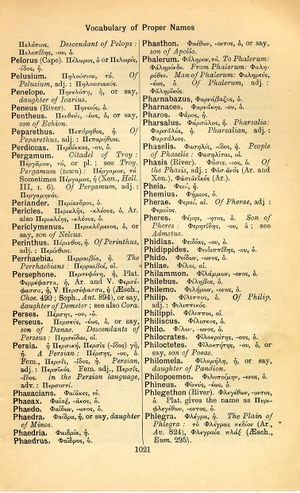Periander: Difference between revisions
From LSJ
Καιροῦ τυχὼν καὶ πτωχὸς ἰσχύει μέγα → Mendicus etiam saepe valet in tempore → Zur rechten Zeit vermag sogar ein Bettler viel
m (Text replacement - "link={{" to "link={{") |
m (Text replacement - "(|thumb)\n(\|link=)" to "$1$2") |
||
| Line 1: | Line 1: | ||
{{WoodhouseENELnames | {{WoodhouseENELnames | ||
|Text=[[File:woodhouse_1021.jpg|thumb | |Text=[[File:woodhouse_1021.jpg|thumb|link={{filepath:woodhouse_1021.jpg}}]]Περίανδρος, ὁ. | ||
|link={{filepath:woodhouse_1021.jpg}}]]Περίανδρος, ὁ. | |||
}} | }} | ||
{{Lewis | {{Lewis | ||
Revision as of 16:55, 18 May 2020
English > Greek (Woodhouse)
Περίανδρος, ὁ.
Latin > English (Lewis & Short)
Pĕrĭander: dri, m., = Περίανδρος,
I son of Cypselus, a king of Corinth, and one of the seven wise men of Greece, Gell. 16, 19, 4; Aus. Lud. Sept. Sapient. fin.; Hyg. Fab. 221.
Latin > French (Gaffiot 2016)
Pĕrĭandĕr (-drus Hyg. Fab. 194 ), drī, m. (Περίανδρος), Périandre [roi de Corinthe, l’un des Sept Sages de la Grèce] : Gell. 16, 19, 4.
Latin > German (Georges)
Periander u. Periandrus, drī, m. (Περίανδρος), Tyrann von Korinth, einer der sieben Weisen, Form -der, Gell. 16, 19, 4. Hyg. fab. 221: Form -drus, Hyg. fab. 194 u. Auct. sent. bei Hyg. fab. 221. Sidon. carm. 23, 103.

